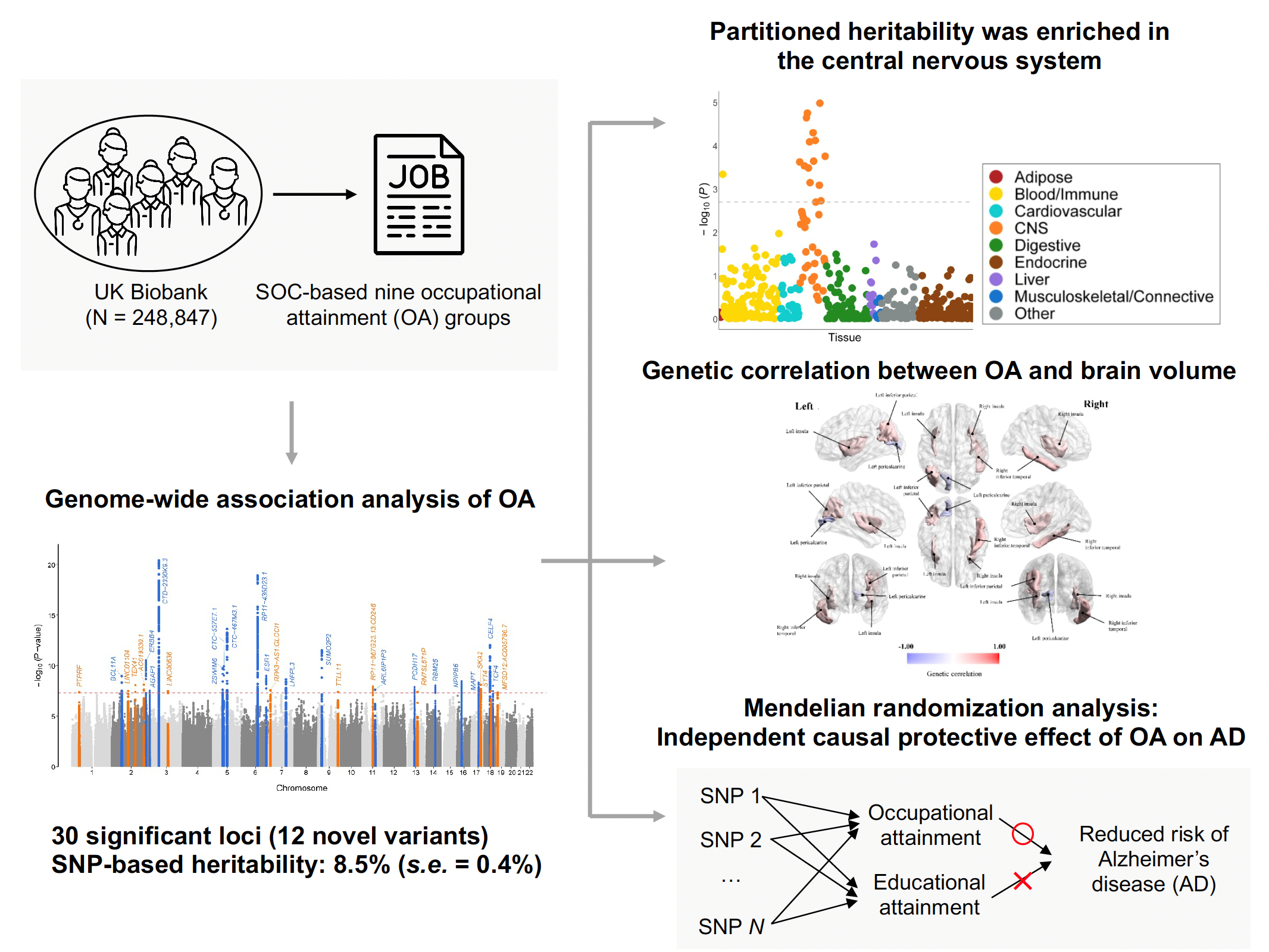Samsung Advanced Institute for Health Sciences and Technology Professor WON, Hong Hee’s research team,
discovers higher career achievements related to lower risk of Alzheimer’s
-In cooperation with Samsung AdvancedInstitute for Health Sciences and Technology (Samsung Medical Center) SamsungGenome Institute Research team
-The research was published in the internationalacademic journal ‘Brain’ (IF 13.5)

[photo] Professor Won Hong Hee, Professor Myung Woo Jae, Researcher Kim So Yeon, Researcher Ko Hyung Woong
Samsung Advanced Institute for Health Sciences and Technology (Samsung Medical Center) / Samsung Genome Institute Pofessor Won Hong Hee’s research team revealed that higher achievements at work could decrease the risk of Alzheimer’s. The team was joint research with SKKU researcher Kim So Yeon, Seoul National University Bundang Hospital Professor Myung, Woo Jae, and Seoul National University researcher Ko Hyung Woong.
Investigating the relationship between educational achievement and Alzheimer's has been constant for a long time. It is well known that higher achievements lead to a lower risk of Alzheimer's.Such protective effects are known as cognitive reserve theory, which includes educational and professional or leisure activities. Professional accomplishment during elderly age requiring long-term cognitive activity is as significant asacademic achievement of early age. However, such topics' precedent research was limited, and genetic study about professional achievement had rarely been tried, implying difficulties extracting precise causal relationships.
To certify this hypothesis, the research team conducted a genome-wide association study (GWAS) to 248,847 UK Biobank participants using the phenotype and their genome information according to 9 different occupational classes defined by the standard occupational classification system from UK Office for National Statistics.
As a result, 30 genetic mutations related to occupational achievement were found, and 12 of them were newly discovered through this study. In addition, post-GWAS analysis confirmed that most mutations were related to educational achievement, cognitive function, and gene expression in the central nervous system. In particular, through genetic correlation analysis, occupational achievement significantly correlated with various characteristics such as physical health, mental health, social health, and lifestyle.

[Research Overview] Relationship between career achievements and Athe risk of Alzheimer's
The research team analyzed the causality relationship between professional achievement and Alzheimer’s disease using highly relative to professional achievement and genetic variations for the Mendelian randomization study method.
According to the research, as professional achievement increases, the occurrence risk of Alzheimer’s decreases by 22%. Also, by applying the additional multivariate Mendelian random method that revises educational effects that directly and indirectly affect Alzheimer's disease and professional achievement, the protective effect of professional achievement on Alzheimer's disease is confirmed.
Researcher Kim So Yeon (Samsung Advanced Institute for Health Sciences M.S and Ph.D. combined) described, "Korea's social and economic burden is increasing due to increase of Alzheimer patients as the elderly population grows. Therefore, it is meaningful that this research suggested an important protective factor of cognitive activity in elderly age to prevent Alzheimer's disease."
Professor Won Hong Hee said, “This research is essential since professional achievement is a critical protective factor to Alzheimer’s disease and the discovery of causality between these. Also, the genetic variation investigated in this research will provide crucial proof for researching the biological mechanism of professional achievement."
The research was published in the top 5% famous international academic journal in the neuroscience field, ‘Brain (Impact Factor: 13.5). This research is supported by: The Ministry of Science and ICT, Mid-sized Research Support Project for Basic Research Projects promoted by the Korea Research Foundation, Up-and-coming center linkage project, Ministry of Health and Welfare, Research and Development Project of the Korea Health Industry Promotion Agency, Biomedical Global Human Resources Development Project, Ministry of Science and ICT, Information and Communication Industry Promotion Agency.















